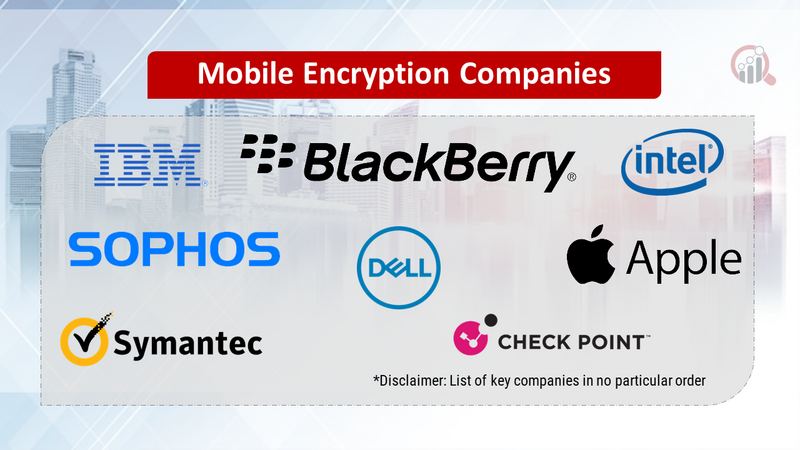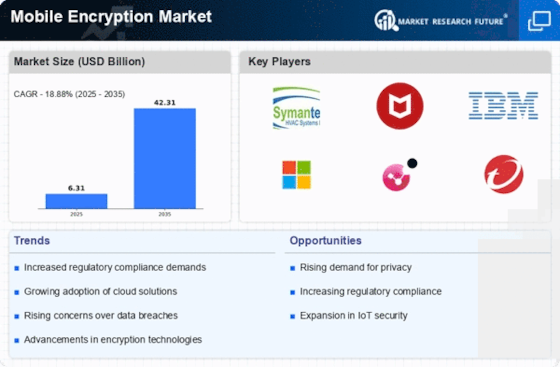Top Industry Leaders in the Mobile Encryption Market

Decoding Defense: A Deep Dive into the Mobile Encryption Market Landscape
The exponential growth of mobile data and rampant cyber threats have propelled the mobile encryption market into a vibrant battlefield, established giants and ambitious startups clash for dominance, seeking to safeguard sensitive information on our increasingly mobile devices. Navigating this dynamic landscape requires a nuanced understanding of the key players, their strategies, and the factors shaping market share.
Key Players:
- IBM (US)
- Apple Inc. (US)
- Intel Corporation (US)
- Dell Technologies Inc. (US)
- Blackberry Ltd (Canada)
- Certes Networks Inc. (US)
- Mobileiron Inc. (US)
- Symantec Corporation (US)
- Sophos Ltd. (UK)
- Communication Security Group (US)
- Alertboot Data Security (US)
- T-Systems International GmbH (Germany)
- Check Point Software Technologies Ltd. (Israel)
- Adeya SA (Switzerland)
- DataMotion Inc. (US)
Strategies for Market Share Growth:
-
Product Differentiation: Players compete on the sophistication of encryption algorithms, key management methodologies, zero-knowledge proof protocols, and granular control over application encryption. Advanced functionalities like self-healing encryption and containerization become key differentiators.
-
Platform Agnosticism: Ensuring compatibility across various mobile operating systems (iOS, Android, Windows Phone) expands reach and caters to diverse customer needs.
-
Threat Intelligence Integration: Integrating solutions with real-time threat intelligence platforms improves defense against evolving cyber threats and targeted attacks.
-
Compliance Focus: Building solutions that comply with data privacy regulations like GDPR and HIPAA strengthens market access and customer trust.
Factors for Market Share Analysis:
-
Product Portfolio Breadth: The scope of data and app protection offered, including file encryption, communication encryption, and cloud storage encryption, contributes to market share.
-
Customer Base Demographics: The number and type of customers served (enterprise, SMB, government, individual consumers) indicate a company's reach and market penetration.
-
Regional Presence: Global reach and presence in high-growth markets like Asia Pacific are crucial for larger players seeking wider market access.
-
Integration Capabilities: Seamless integration with existing mobile device management (MDM) and enterprise security platforms fosters adoption and simplifies deployment.
Current Investment Trends:
-
Cloud Focus: Investment in building secure and scalable cloud-based mobile encryption platforms is accelerating, catering to the increasing adoption of cloud services and remote work trends.
-
AI and Machine Learning Integration: Leveraging AI to detect anomalous behavior and predict cyber threats within encrypted data enhances security without compromising privacy.
-
Quantum-Resistant Cryptography: Developing encryption algorithms resilient to future quantum computing threats is a major area of investment, ensuring long-term data protection.
-
User-Centric Approach: Simplifying user interfaces and offering granular control over encryption settings empowers users and promotes broader adoption.
The mobile encryption market is complex and constantly evolving. Understanding the competitive landscape, including key players, strategies, and emerging trends, equips businesses, individuals, and policymakers with the knowledge to make informed decisions about safeguarding their mobile data in an increasingly vulnerable digital world.
Latest Company Updates:
January 10, 2024: McAfee announces the launch of its MVISION Mobile for iOS and Android, offering comprehensive mobile security with data encryption, endpoint protection, and threat intelligence.
December 15, 2023: Samsung integrates Knox, its robust mobile security platform, with Microsoft Azure Active Directory for enhanced enterprise data protection and access control on mobile devices. (Source: Samsung press release)
November 30, 2023: Apple unveils iOS 17 with improved end-to-end encryption features for iCloud backups and iMessage, bolstering user privacy on its devices.

